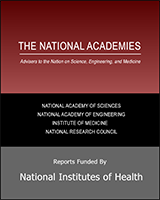NCBI Bookshelf. A service of the National Library of Medicine, National Institutes of Health.
Excerpt
To plan and execute a clinical trial today can take years and cost hundreds of millions of dollars. In the past, the United States was considered the best place to conduct clinical trials because of the right mix of clinical and scientific expertise and an understanding of the research process. However, many believe that the clinical research enterprise in the United States has failed to keep pace with that in the rest of the world because of this time and cost burden. To evaluate the state of clinical research in the United States and identify strategies for enhancing the effectiveness and efficiency of clinical trials, the Institute of Medicine’s Forum on Drug Discovery, Development, and Translation convened a public workshop on October 7–8, 2009, titled Transforming Clinical Research in the United States. Clinical trial experts from academic research centers, pharmaceutical companies, contract research organizations, government, nonprofit research networks, and patient advocacy groups came together to discuss their clinical trial successes and failures, the challenges they face in conducting clinical research, and strategies for improving the efficiency of clinical trials while maintaining the highest standards for the data generated.
The intent of the workshop was to engage stakeholders in an honest discussion of the state of clinical trials today and to gain an understanding of what has and has not worked in planning and executing trials. The workshop was focused on four disease areas: cardiovascular disease, depression, cancer, and diabetes. Although “clinical research” is a generic term, a clinical trial in breast cancer, with 5-, 10-, or 15-year outcomes, is quite different from a clinical trial in cardiovascular disease, where the outcome of interest may occur in a month or less. The disease being studied also affects the kind of patients needed and how they are recruited and retained. Gaining an appreciation of the differences in clinical trials by disease helped generate ideas for improving the clinical research enterprise as a whole.
Contents
- The National Academies
- Planning Committee for the Workshop on Transforming Clinical Research in the United States
- Forum on Drug Discovery, Development, and Translation
- Reviewers
- Preface
- Acronyms
- 1. Introduction
- 2. The State of Clinical Research in the United States: An Overview
- 3. Challenges in Clinical Research
- PRIORITIZING OF CLINICAL RESEARCH QUESTIONS
- THE DIVIDE BETWEEN CLINICAL RESEARCH AND CLINICAL PRACTICE
- GLOBALIZATION OF CLINICAL TRIALS
- THE COST OF CLINICAL TRIALS
- NARROW INCENTIVES FOR PHYSICIAN PARTICIPATION IN CLINICAL RESEARCH
- SHRINKING CLINICAL RESEARCH WORKFORCE
- NEED TO NAVIGATE ADMINISTRATIVE AND REGULATORY REQUIREMENTS
- RECRUITMENT AND RETENTION OF PATIENTS
- 4. Clinical Trials in Cardiovascular Disease
- 5. Clinical Trials in Depression
- 6. Clinical Trials in Cancer
- 7. Clinical Trials in Diabetes
- 8. Building a Robust Clinical Trials Infrastructure
- References
- Appendixes
Rapporteurs: Rebecca A English, Yeonwoo Lebovitz, and Robert B Giffin
This project was supported by the Department of Health and Human Services (Contract Nos. N01-OD-4-2139 and 223001003T), the American Diabetes Association, the American Society for Microbiology, Amgen Inc., the Association of American Medical Colleges, AstraZeneca Pharmaceuticals, the Burroughs-Wellcome Fund, Celtic Therapeutics, LLLP, the Critical Path Institute, the Doris Duke Charitable Foundation, Eli Lilly & Co., Entelos Inc., Genentech, GlaxoSmithKline, Johnson & Johnson, Novartis Pharmaceuticals Corporation, and Pfizer Inc.
Suggested citation:
IOM (Institute of Medicine). 2010. Transforming Clinical Research in the United States: Challenges and Opportunities: Workshop Summary. Washington, DC: The National Academies Press.
Any opinions, findings, conclusions, or recommendations expressed in this publication are those of the author(s) and do not necessarily reflect the view of the organizations or agencies that provided support for this project.
NOTICE: The project that is the subject of this report was approved by the Governing Board of the National Research Council, whose members are drawn from the councils of the National Academy of Sciences, the National Academy of Engineering, and the Institute of Medicine.
- NLM CatalogRelated NLM Catalog Entries
- Review Public Engagement and Clinical Trials: New Models and Disruptive Technologies: Workshop Summary[ 2012]Review Public Engagement and Clinical Trials: New Models and Disruptive Technologies: Workshop SummaryInstitute of Medicine (US). 2012
- American Society of Clinical Oncology policy statement: oversight of clinical research.[J Clin Oncol. 2003]American Society of Clinical Oncology policy statement: oversight of clinical research.American Society of Clinical Oncology. J Clin Oncol. 2003 Jun 15; 21(12):2377-86. Epub 2003 Apr 29.
- The NCI All Ireland Cancer Conference.[Oncologist. 1999]The NCI All Ireland Cancer Conference.Johnston PG, Daly PA, Liu E. Oncologist. 1999; 4(4):275-277.
- The project data sphere initiative: accelerating cancer research by sharing data.[Oncologist. 2015]The project data sphere initiative: accelerating cancer research by sharing data.Green AK, Reeder-Hayes KE, Corty RW, Basch E, Milowsky MI, Dusetzina SB, Bennett AV, Wood WA. Oncologist. 2015 May; 20(5):464-e20. Epub 2015 Apr 15.
- Review Envisioning a Transformed Clinical Trials Enterprise in the United States: Establishing An Agenda for 2020: Workshop Summary[ 2012]Review Envisioning a Transformed Clinical Trials Enterprise in the United States: Establishing An Agenda for 2020: Workshop SummaryInstitute of Medicine (US). 2012
- Transforming Clinical Research in the United StatesTransforming Clinical Research in the United States
Your browsing activity is empty.
Activity recording is turned off.
See more...
